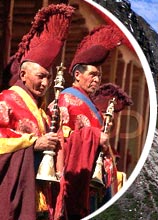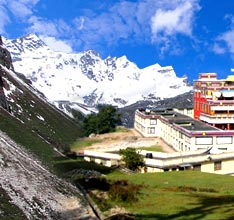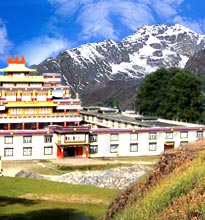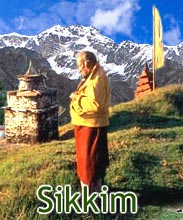 Rumtek
Monastery is the most cherished site of almost every Buddhist. Situated
at a distance of 24 kms from Gangtok in Rumtek, the Monastery appears
tranquil amidst the picturesque background of lofty hills and soothing
waterfalls. Rumtek Monastery is one amongst the most important seats of
Kagyu school of Buddhism outside Tibet. Originally, Rumtek Monastery was
built in the 16th century under the supervision of Wangchuk Dorje, the
9th Karmapa with the financial assistance of the fourth King of Sikkim.
Rumtek
Monastery is the most cherished site of almost every Buddhist. Situated
at a distance of 24 kms from Gangtok in Rumtek, the Monastery appears
tranquil amidst the picturesque background of lofty hills and soothing
waterfalls. Rumtek Monastery is one amongst the most important seats of
Kagyu school of Buddhism outside Tibet. Originally, Rumtek Monastery was
built in the 16th century under the supervision of Wangchuk Dorje, the
9th Karmapa with the financial assistance of the fourth King of Sikkim.Forlornly, this monastery was devastated by a ravaging fire in the 20th century. In 1960's, a new monastery was built uphill the original Rumtek Monastery. This new monastery came be to known as Rumtek Dharma Chakra Centre. Built by the 16th Gyalwang Karmapa, the religious centre has a well-structured main shrine temple and monastery with the quarters of monks. In one of these quarters, the Karmapa stay, lingering in the spiritual ecstasy. The colossal prayer hall inside the monastery is worth mentioning that is adorned with lovely murals, statues and 'tangkhas'.
Rumtek Dharma Chakra Centre has become an all-inclusive institution, where Relics (belonging to the 16th Karmapa), Retreat Centre, 'Shedra' (monastic college), Nunnery, Stupas (protector's shrine), Institutions for the lay community and other establishments are working under the same ceiling. In 1966, Rumtek Dharma Chakra Centre was inaugurated by the 16th Karmapa himself on the Tibetan New Year's Day (Losar). He called this centre as "a place of erudition and spiritual accomplishment, the seat of the glorious Karmapa."
The Golden Stupa in the monastery encompasses the relics of the 16th Karmapa. Rumtek Monastery hosts various Tibetan festivals throughout the year. On the 10th day of the 5th month (June) of the Tibetan calendar, the annual dance of Tse-Chu Chaam is organized at the monastery. Kagyat Dance also takes place on the 28th & 29th day of the 10th month of the lunar calendar. Rumtek Monastery / Dharma Chakra Centre is a must visit for all those who want to explore the cultural and religious roots of Sikkim.








